Guide for RITO
1. Login as an Administrator
The homepage of DepEd Monitoring is at mobileapp.deped.gov.ph. To login as an administrator, you will see the "Admin Login" link at the lower right portion of the page. Click it and input your administrator credentials on the login form. Click login and you will be redirected to the Admin Portal Dashboard.
On your initial login, you will be redirected to your account profile. You will be asked to update your temporary password.
Figure 1. DepEd Monitoring Landing Page (left) and Admin Login Page (right)
2. Admin Portal Interface
The user interface for the Admin Portal is very straightforward and easy-to-use. In this chapter, we will discuss the four (4) main parts of this portal.
Figure 2. Admin Portal Dashboard
2.1. Dashboard
Dashboard is the homepage of the Admin Portal (see Figure 2). It contains the statistics of the responses gathered from the Facility Tracking survey (COVID-19 Responses).
The figures displayed here will change depending on what type of administrator is currently logged in. For example, as a Regional IT Officer (RITO), you can see the data here within your designated region and the divisions under it. Another example is if a Division IT Officer (DITO) is currently logged in, the available data displayed for them is already filtered by their designated division. They could only see the statistics for their division and the schools under it.
3. User Management
There are two kinds of users in DepEd Monitoring: an administrator and a normal user (survey respondents). As a RITO, you have the access to manage them both. You can create, view, and edit an administrator and a user.
3.1. Administrator
This chapter will focus on managing administrators. As a RITO, you can view the list of administrators, create a new one, and you can also view, or edit existing one.
3.1.1. Admin Roles
There are six (6) different admin roles available. Each one has its own access and permissions to the Admin Portal.
- Super Admin - has access to all tasks (create, view, edit, and delete), modules, and reports; only role that has the ability to delete a record.
- Central Office - has access to all modules and reports and with tasks to create, view, and edit records.
- RITO (Regional IT Officer) - has access to modules, reports, and users within jurisdiction; can edit records within their designated Region.
- DITO (Division IT Officer) - has access to modules, reports, and users within jurisdiction; can edit records within their designated Division.
- Survey Creator - has access to modules and reports specific to survey management, and with tasks to create, view, and edit records.
- Support - has view and edit capabilities on limited modules.
3.1.2. View Administrator List
To view all the administrators, go to Setup, then select Admin Users.
On the top, you can filter the list by clicking a specific role. For example, in Figure 3, DITO has been clicked, that is why the list only displayed administrators with that role. More filters are available if you click the filter icon on the right. Available filter fields are: Name, Email, Region, and Division.
On the bottom, you can download the list of administrators displayed by clicking CSV.
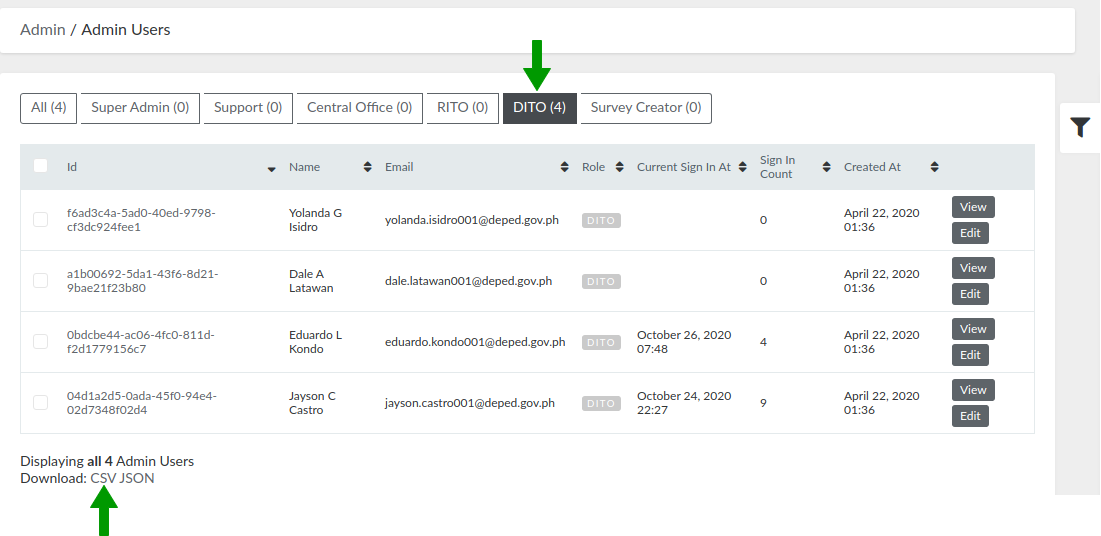
Figure 3. Administrator List
3.1.3. View a Specific Administrator
Step 1. Go to Setup, then select Admin Users.
Step 2. Search the specific administrator, and click their Administrator ID or the View button on the right.

Figure 4. Administrator ID (green box) and Action Buttons (yellow box)
In the view page, you can see the administrator details and a list of users this specific administrator has approved. The user approval process will be discussed in detail on Chapter 3.2.4.
3.1.4. Edit an Administrator
Step 1. Go to Setup, then select Admin Users.
Step 2. Search the specific administrator, and click the Edit button on the right.
Step 3. Update the administrator user details.
Step 4. Click the "Update Admin user" button.
3.2. User/Respondent
This chapter will focus on managing normal users or respondents. As a RITO, you can view the list of users, and you can also view, or edit an existing one.
3.2.1. View User List
To view all the respondents, simply click Users on the navigation bar. As a RITO, only users within your designated region will be displayed in the list.
On the top, you can filter the list by clicking a specific status:
-
- Active - approved users
- Pending Approval - users that have confirmed their account, but are not yet approved
- Rejected - users that have confirmed their account, but are rejected
- Unconfirmed Registrations - users that have not yet confirmed their account
More filters are available if you click the filter icon on the right. Available filter fields are: Email, Email validation status, Name, Mobile, Created at.
Figure 5. User List
3.2.2. View a Specific User
Step 2. Search the specific user, and click the View button on the right.
In the view page, you can see the following data:
-
- User details - general information of the user
- Special assignments - surveys they are assigned to answer
3.2.3. Approve or Reject a User
An account can only be approved or rejected if the user has already confirmed their email address. To approve or reject a user, follow these simple steps:
Step 2. For easier search, click the "Pending Approval" filter on top of the page, then search using their email, name, or mobile number.
Step 3. Click the View button on the right.
Step 4. Click the Approve or Reject button on the upper-right portion of the view page.
-
- Some users registered twice using a DepEd email and personal email. Reject non-DepEd email registration.

Figure 6. Approve User Button
Approved users will receive a welcome email and will be eligible to use the DepEd Mobile Application. While rejected users will only receive a rejection email, and will not gain access to use the mobile application.
3.2.3.1. Approver Statistics
In this module, you can view a list of administrators within your designated region and their corresponding number of users approved. To access this, simply click Approver Statistics on the navigation bar.
You can generate a CSV report of this by clicking the "Export to CSV" button on the upper-right.
These statistics can only be filtered depending on the date of approval of the users. You can select whether the users are approved within the day, week or month.
Figure 7. Approver Statistics
To see the list of users that a specific administrator has approved, simply click the administrator's name, and you will be redirected to the administrator's profile. On the profile page, look for the table named "Users Approved".
Figure 8. Users Approved Table
3.2.4. Edit a User
Step 2. Search the specific user, and click the Edit button on the right.
Step 3. Update the user details.
Step 4. Click the "Update User" button.
Another thing that can be done on the user edit form is assigning the user to survey(s). This will be discussed in detail on Chapter 4.3.
4. Questionnaire Management
4.1. View Questionnaire List
To view all the questionnaires, go to Dynamic Tracking, then select Questionnaires.
On the top, you can filter the list by the questionnaire's allowed respondents (DepEd Users, Limited, Parents, or Students). You can also view all the archived ones by clicking the "Show Archived Questionnaires" button.
More filters are available if you click the filter icon on the right. Available filter fields are: Title, Description, Status, Created at and Updated at. Email validation status, Name, Mobile, Created at.
Figure 9. Questionnaire List
4.2. View a Specific Questionnaire
Step 1. Go to Dynamic Tracking, then select Questionnaires.
Step 2. Search the specific questionnaire, and click the View button on the right.
The view page of a questionnaire has three (3) parts:
- Questionnaire details - general information and configuration of the questionnaire
- Questions, Assignments, etc. - in this part, you can view the list of questions of the survey. If a questionnaire is for limited users, you can assign the questionnaire to multiple users on the Assignment tab.
- Report recipients - in this tab, you can assign recipients who will receive a daily report via email. The report contains submissions of the questionnaire.
- Response Stats/ Downloads - you can view and download the response statistics by: region, division or municipality.
If a questionnaire is a tracker, the response stats can be narrow down by an as-of-date filter.
4.2.1. Questionnaire Reports
- Show Responses - click this button to see the list of response entries from the questionnaire. Select a specific entry, and click its view button. This will show you the Report Information of the respondent and their individual response to the questionnaire. A revision history is also available if users are allowed to resubmit responses.
If a questionnaire is a tracker, a unique user can have multiple response entries. If a questionnaire is a survey, a unique can only have exactly one response entry.
- Show Response Stats -click this button to see the statistics for each option of all the questions
- Extract Responses to CSV - click this button to download a CSV file containing all the responses of the survey
- Regional / Division / Municipality Response Stats - click this to see the number of responses per region, division, or municipality. There is a column for the number of responses from the public schools and private schools along with the sex of the respondent. There is also a column for the percentage of respondents from the total.
- CSV Download - response statistics can be downloaded in a CSV format. You may specify the geographic location of the response stats by selecting region, division, municipality and/or school.
4.3. Assign Respondents to a Questionnaire
If the allowed respondents of a questionnaire is "Limited DepEd Users", you must assign the survey to specific users. To do this, follow these steps:
Step 1. Click Users on the navigation bar.
Step 2. Search for the specific user, and click the Edit button on the right.
Step 3. Click "Special Assignments".
Step 4. Click "Add New Survey assignment".
Step 5. On the Questionnaire field, search for the survey using its name.
NOTE: Only active questionnaires with "Limited DepEd Users" as the allowed respondents will be available on this list.
Step 6. Click the "Update User" button.
4.4. Unassign Respondent from a Questionnaire
The steps for removing the assignment of a respondent from a questionnaire is similar to the steps described in the previous chapter.
Step 1. Click Users on the navigation bar.
Step 2. Search for the specific user, and click the Edit button on the right.
Step 3. Click "Special Assignments".
Step 4. Tick the checkbox for "Remove this assignment?"
Step 5. Click the "Update User" button.
Figure 10. Remove Survey Assignment from Respondent
5. Facility Tracking (COVID-19 Response)
The Facility Tracking module is a list of responses submitted by the approved DepEd users who have answered the COVID-19 Facility Tracker survey, which is specifically about the use of school facilities during this pandemic. This list is filtered within your designated region only.
To access this module, click COVID-19 Response on the navigation bar, then select Facility Tracking. The responses can be categorized in three (3) statuses:
- In Utilization - schools that are currently used during this COVID-19 situation
- LGU Requested - schools which have been requested for use
- Not Used - schools which are not in use
On the top, you can filter the list by clicking a specific status. For example, in Figure 16, "In Utilization" has been clicked, that is why the list only displayed responses with that status.
On the bottom, you can download the list of responses displayed by clicking CSV.
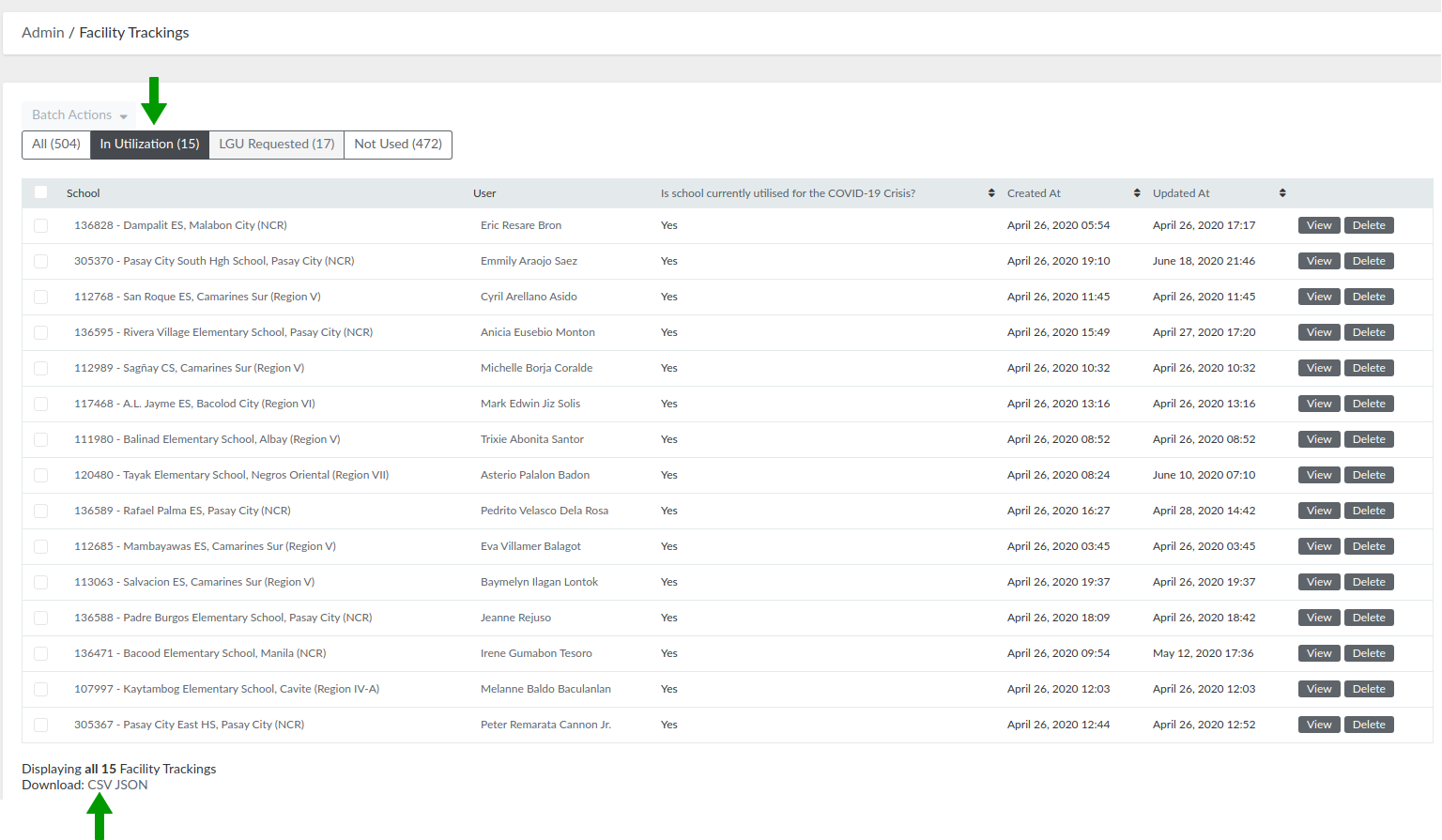
Figure 11. Facility Tracking
6. Memorandums
Administrators can setup memos and official announcements published on the DepEd Mobile Application that can be viewed by the approved DepEd users. To view these, click Memorandums on the navigation bar.
Figure 12. Sample Memorandum on DepEd Mobile Application

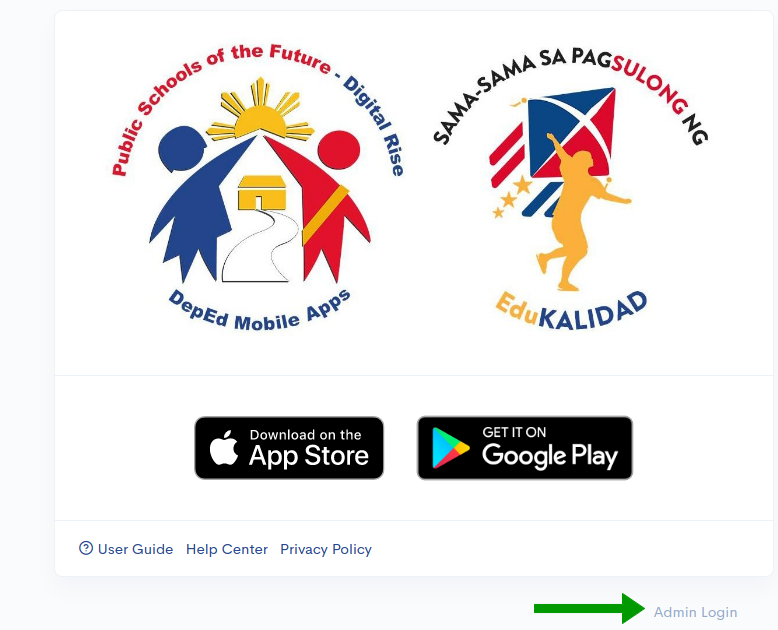
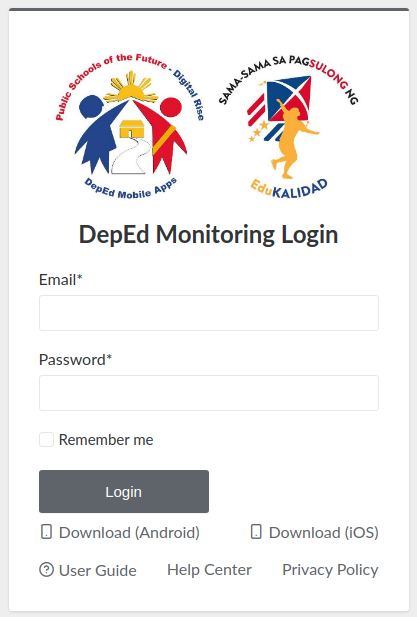
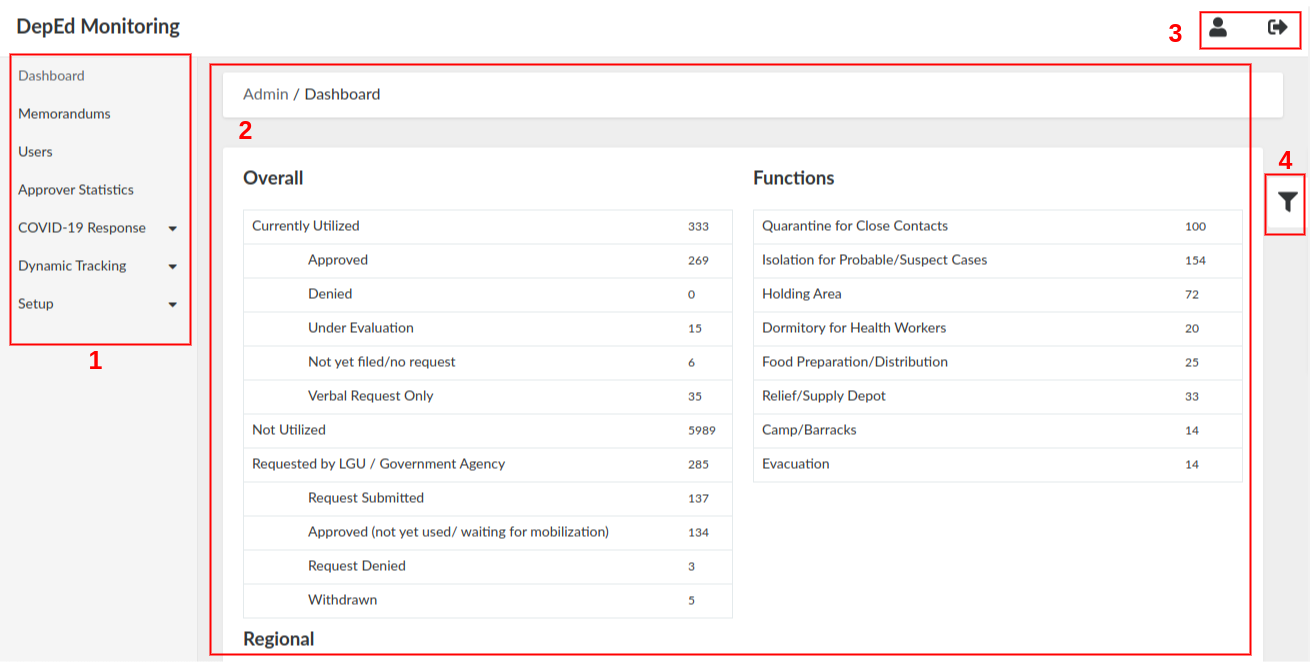
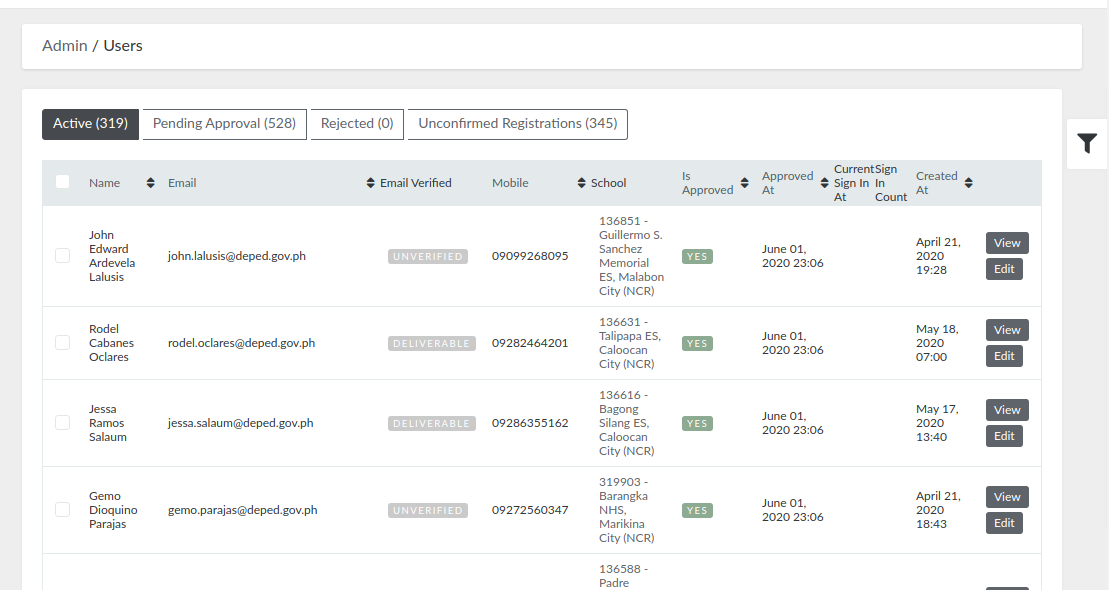
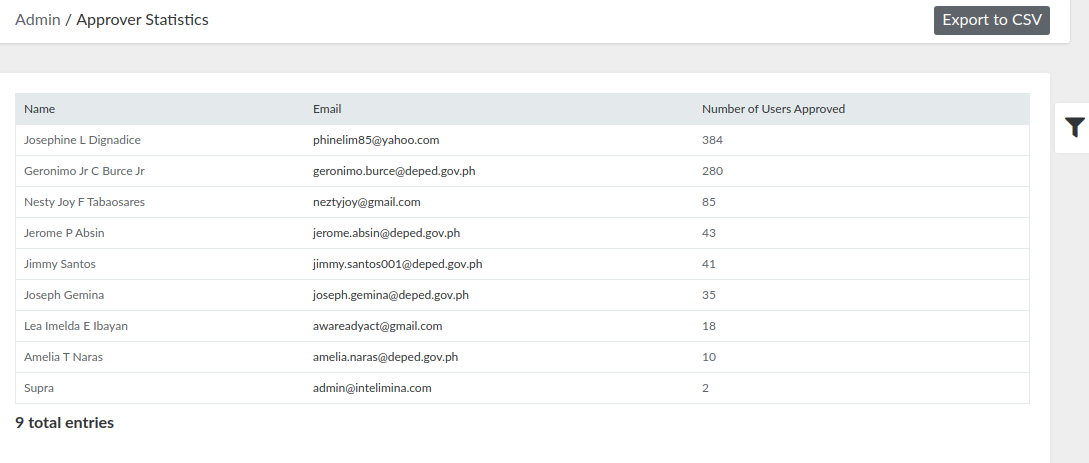
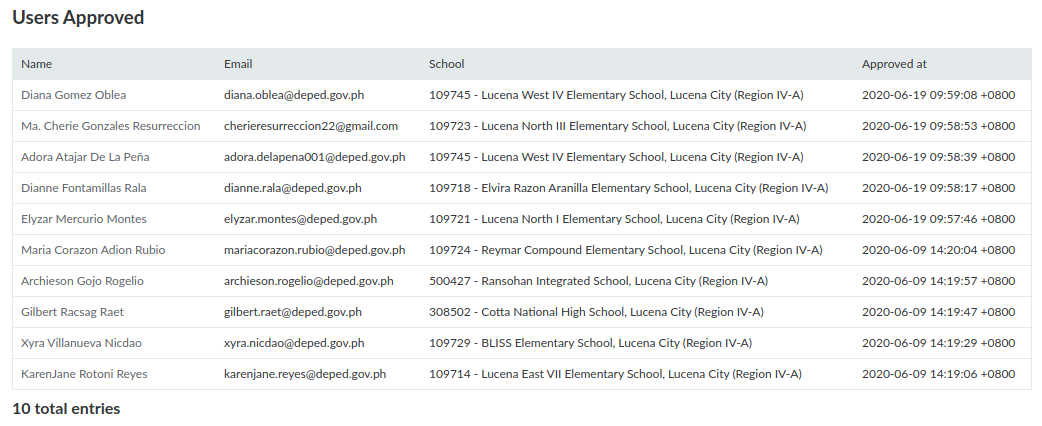


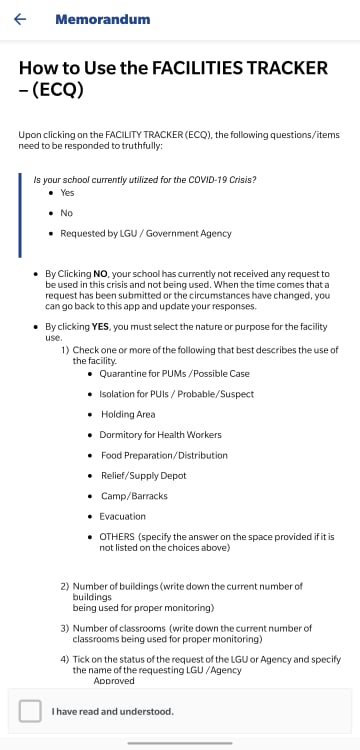
No Comments